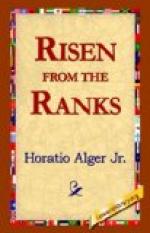“Is he coming back this term?”
“Yes, he came on the same train with me. Hasn’t he called to pay his respects to you?”
“No,” answered Harry, with a smile. “He hasn’t done me that honor. He probably expects me to make the first call.”
“Well, Harry, I suppose you will be on hand next week, when the Clionian holds its first meeting?”
“Yes, I will be there.”
“And don’t forget to call at my room before that time. I want to examine you in French, and see how much progress you have made.”
“Thank you, Oscar.”
“Now I must be going. I have got a tough Greek lesson to prepare for to-morrow. I suppose it will take me twice as long as usual. It is always hard to get to work again after a long vacation. So good-morning, and don’t forget to call at my room soon—say to-morrow evening.”
“I will come.”
“What a gentlemanly fellow your friend is!” said Ferguson.
“What is his name, Harry?” asked Mr. Anderson.
“Oscar Vincent. His father is an editor in Boston.”
“What! the son of John Vincent?” said Mr. Anderson, surprised.
“Yes, sir; do you know his father?”
“Only by reputation. He is a man of great ability.”
“Oscar is a smart fellow, too, but not a hard student.”
“I shall be glad to have you bring him round to the house some evening, Harry. I shall be glad to become better acquainted with him.”
“Thank you, sir. I will give him the invitation.”
It is very possible that Harry rose in the estimation of his employer, from his intimacy with the son of a man who stood so high in his own profession. At all events, Harry found himself from this time treated with greater respect and consideration than before, and Mr. Anderson often called upon him to write paragraphs upon local matters, so that his position might be regarded except as to pay, as that of an assistant editor.
CHAPTER XXII.
Miss DEBORAH’S eyes are opened.
Aunt Deborah felt that she had done a good stroke of business. She had lent Ferdinand four hundred and fifty dollars, and received in return a note for five hundred and fifty, secured by a diamond ring worth even more. She plumed herself on her shrewdness, though at times she felt a little twinge at the idea of the exorbitant interest which she had exacted from so near a relative.
“But he said the money was worth that to him,” she said to herself in extenuation, “and he’s goin’ to get two thousand dollars a year. I didn’t want to lend the money, I’d rather have had it in the savings bank, but I did it to obleege him.”
By such casuistry Aunt Deborah quieted her conscience, and carefully put the ring away among her bonds and mortgages.
“Who’d think a little ring like that should be worth so much?” she said to herself. “It’s clear waste of money. But then Ferdinand didn’t buy it. It was give to him, and a very foolish gift it was too. Railly, it makes me nervous to have it to take care of. It’s so little it might get lost easy.”




